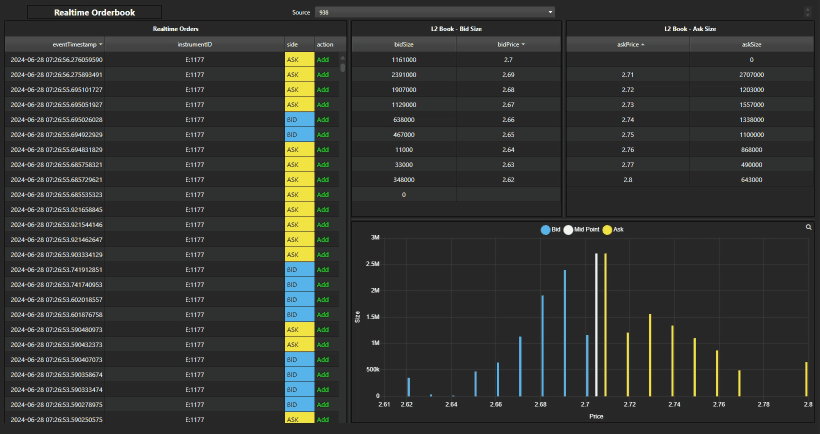ICE Order Book Accelerator Quickstart Guide
This page provides a quickstart guide for the ICE Order Book Accelerator.
The ICE Order Book Accelerator is an FSI Accelerator package which comes with ready made Pipelines, Views, and Schemas out of the box.
Prerequisites
This quickstart guide is not intended to be a comprehensive kdb Insights Install Guide; for more information regarding kdb Insights Enterprise installation refer to the kdb Insights Enterprise documentation.
This guide assumes the following prerequisites:
-
kdb Insights Enterprise installed
-
Necessary credentials obtained and configured: Insights Users: GUI User API Client
-
kx download portal bearer token to download packages/charts (represented by BEARER in this guide).
-
ICE Credentials: ICE Consolidated Feed Username & Password ICE Consolidated Feed IP Address & Port Number
-
Necessary Tools Used: Access to *nix command-line KDB Insights CLI -
kxiKubernetes tools: kubectl K9s Helm installed and logged in to nexus VSCode with the following plugins: KX kdb Jupyter
-
Quickstart guide
Important
Before you begin, set your Accelerator and fsi-lib version, as shown below. This helps simplify the download and installation commands.
Shell
export ACCELVER=1.4.0
export FSILIBVER=1.3.3 Download the required FSI packages from the KX download portal:
Shell
# Download fsi-lib - the Core FSI Library
curl -s --fail-with-body -D /dev/stderr --oauth2-bearer ${BEARER} -L -OJ https://portal.dl.kx.com/assets/raw/kxi-accelerators/fsi/fsi-lib/packages/${FSILIBVER}/fsi-lib-${FSILIBVER}.kxi
# Download fsi-app-ice-orderbook - the ICE Orderbook Accelerator
curl -s --fail-with-body -D /dev/stderr --oauth2-bearer ${BEARER} -L -OJ https://portal.dl.kx.com/assets/raw/kxi-accelerators/fsi/fsi-ice-orderbook/packages/${ACCELVER}/fsi-app-ice-orderbook-${ACCELVER}.kxiUnpack fsi-app-ice-orderbook:
Shell
kxi package unpack fsi-app-ice-orderbook-${ACCELVER}.kxiUpdate the example ICE Feedhandler Config File to include your credentials and preferences.
Note
-
The config file contains a lot of commonly pre-populated default values.
-
Any values that are expected to require updating on a per-deployment bases have been marked with a
TODOcomment, for example: Connection Details Subscription List
Shell
vi fsi-app-ice-orderbook/config/feed/ice-orderbook-feed-values.yaml
Push the packages to Insights and deploy the fsi-ice-orderbook-assembly and realtime pipelines:
Shell
# Install the packages
kxi pm push fsi-lib-${FSILIBVER}.kxi
kxi pm push fsi-app-ice-orderbook-${ACCELVER}.kxi
# Deploy the assembly
kxi pm deploy fsi-app-ice-orderbook --db fsi-core-db
# Deploy the pipelines
kxi pm deploy fsi-app-ice-orderbook --pipeline icerealtimel1
kxi pm deploy fsi-app-ice-orderbook --pipeline icerealtimel2
kxi pm deploy fsi-app-ice-orderbook --pipeline orderbook
Note
At this point you should be able to see the pipelines booting up on the GUI or on k9s.
Add the KX helm repository from the KX downloads portal.
Note
For info on how to set up your downloads bearer token, go to https://portal.dl.kx.com/auth/token
Shell
helm repo add kx https://portal.dl.kx.com/assets/helm --username <INSERT_EMAIL> --password <INSERT_BEARER_TOKEN>
Download the ICE Feedhandler from helm:
Shell
helm fetch kx/rt-ice-pub --version 1.0.2 --untar
Add your ICE Username & Password as a kubernetes secret:
Note
The secret name, in this case my-ice-secrets, should match the ice.secrets.name value in the example config file you previously edited - fsi-app-ice-orderbook/feed/ice-orderbook-feed-values.yaml.
Shell
kubectl create secret generic my-ice-secrets --from-literal=my-username=<INSERT_ICE_USERNAME> --from-literal=my-password=<INSERT_ICE_PASSWORD> -n <YOUR_NAMESPACE>
To create a secret for the Helm chart to pull the feed image, use the following command:
Shell
kubectl create secret docker-registry "docker-pull" --docker-server=portal.dl.kx.com --docker-username=<INSERT_EMAIL> --docker-password=<INSERT_BEARER_TOKEN> --docker-email=<INSERT_EMAIL> -n <INSERT_YOUR_NAMESPACE>
Install the ICE Feedhandler Helm Chart using our config file:
Shell
helm install rt-ice-pub ./rt-ice-pub -f fsi-app-ice-orderbook/config/feed/ice-orderbook-feed-values.yaml -n <INSERT_YOUR_NAMESPACE>
Verify the ICE FH is running using kubectl:
Shell
kubectl describe pod rt-ice-pub-0
Expected Output from above command on successful install:
Shell
Events:
Type Reason Age From Message
---- ------ ---- ---- -------
Normal Created 24s kubelet Created container rt-ice-pub
Normal Started 24s kubelet Started container rt-ice-pub
Now that you have the ICE Feedhandler running you should be able to see data flowing in real-time through the Realtime-Orderbook View:
